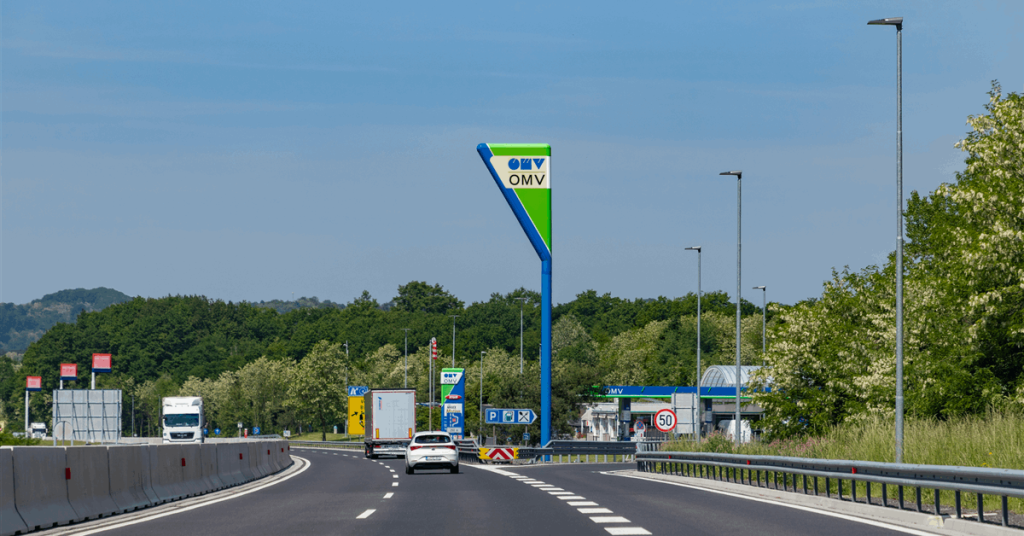OMV AG will implement a new dividend policy from 2026, when it expects to have consolidated its petrochemical assets with Abu Dhabi National Oil Co PJSC (ADNOC), the Austrian state-backed integrated energy company said this week.
On March 4 OMV and ADNOC announced an agreement to combine Borealis GmbH, formerly Borealis AG, and Borouge PLC to form Borouge Group International (BGI).
OMV owns 75 percent of Vienna-based Borealis while ADNOC holds the remaining 25 percent. In Abu Dhabi-based Borouge, ADNOC directly owns 54 percent and Borealis 36 percent.
OMV and ADNOC will each own 46.94 percent in BGI.
They expect to complete the Borealis-Borouge combination in the first quarter of 2026.
“OMV will distribute 50 percent of BGI dividends attributable to OMV, plus 20-30 percent of operating cash flow excluding BGI dividends attributable to OMV”, OMV said in a statement on its website.
“The revised policy ensures OMV shareholders benefiting from BGI’s performance, while maintaining OMV’s strong track record of attractive and competitive shareholder distributions.
“The structure of a progressive regular dividend, plus an additional variable dividend is retained when the leverage ratio is below 30 percent.
“The new dividend policy will apply starting with the financial year 2026, with dividends to be paid in 2027. The current dividend policy will continue to apply for the financial year 2025, with dividends to be paid in 2026”.
BGI is set to become the world’s fourth-biggest polyolefins producer, according to the partners.
“BGI enables access to high-end markets, cost-advantaged feedstock (70 percent of production) and robust cash flows”, OMV said
“Starting in 2026, OMV anticipates a minimum floor dividend of $1 billion from Borouge Group International, significantly strengthening its financial performance”.
OMV also announced an organic investment plan of around EUR 2.8 billion a year on average from 2026 to 2030, with a 30 percent allotment for “sustainable projects”.
“The deconsolidation of Borealis following the creation of BGI will reduce OMV’s cumulative organic capex by around EUR 3.5 billion for the period 2026 to 2030”, the statement said.
“In addition, OMV will optimize capital allocation in its Fuels and Energy segments by reducing organic capex by a further EUR 1.5 billion, rescheduling certain sustainable projects beyond 2030 to balance risk and opportunity”, the statement said.
OMV expects a 6.5 percent compound annual growth rate in sustainable fuels and chemicals such as hydrogenated vegetable oil, ethanol, sustainable aviation fuel, biodiesel and bio-based olefins in its core markets by 2040, the statement said.
For oil and gas, it aims to grow its production capacity to about 400,000 barrels of oil equivalent a day by 2030, the statement said.
“In Romania, the Neptun Deep project is expected to double the country’s future annual gas production, while OMV Petrom will continue to explore the Han Asparuh block offshore in Bulgaria”, OMV said. “In North Africa, OMV is expanding its production, in particular in Libya”.
“In the renewables area, OMV is adjusting its pace while maintaining the overall strategic direction”, it added. “The execution and build-up of its renewable portfolio in Southeastern Europe remains in the focus of the company, with OMV Petrom becoming a leading market player in this area in Southeast Europe”.
To contact the author, email jov.onsat@rigzone.com
element
var scriptTag = document.createElement(‘script’);
scriptTag.src = url;
scriptTag.async = true;
scriptTag.onload = implementationCode;
scriptTag.onreadystatechange = implementationCode;
location.appendChild(scriptTag);
};
var div = document.getElementById(‘rigzonelogo’);
div.innerHTML += ” +
‘‘ +
”;
var initJobSearch = function () {
//console.log(“call back”);
}
var addMetaPixel = function () {
if (-1 > -1 || -1 > -1) {
/*Meta Pixel Code*/
!function(f,b,e,v,n,t,s)
{if(f.fbq)return;n=f.fbq=function(){n.callMethod?
n.callMethod.apply(n,arguments):n.queue.push(arguments)};
if(!f._fbq)f._fbq=n;n.push=n;n.loaded=!0;n.version=’2.0′;
n.queue=[];t=b.createElement(e);t.async=!0;
t.src=v;s=b.getElementsByTagName(e)[0];
s.parentNode.insertBefore(t,s)}(window, document,’script’,
‘https://connect.facebook.net/en_US/fbevents.js’);
fbq(‘init’, ‘1517407191885185’);
fbq(‘track’, ‘PageView’);
/*End Meta Pixel Code*/
} else if (0 > -1 && 54 > -1)
{
/*Meta Pixel Code*/
!function(f,b,e,v,n,t,s)
{if(f.fbq)return;n=f.fbq=function(){n.callMethod?
n.callMethod.apply(n,arguments):n.queue.push(arguments)};
if(!f._fbq)f._fbq=n;n.push=n;n.loaded=!0;n.version=’2.0′;
n.queue=[];t=b.createElement(e);t.async=!0;
t.src=v;s=b.getElementsByTagName(e)[0];
s.parentNode.insertBefore(t,s)}(window, document,’script’,
‘https://connect.facebook.net/en_US/fbevents.js’);
fbq(‘init’, ‘1517407191885185’);
fbq(‘track’, ‘PageView’);
/*End Meta Pixel Code*/
}
}
// function gtmFunctionForLayout()
// {
//loadJS(“https://www.googletagmanager.com/gtag/js?id=G-K6ZDLWV6VX”, initJobSearch, document.body);
//}
// window.onload = (e => {
// setTimeout(
// function () {
// document.addEventListener(“DOMContentLoaded”, function () {
// // Select all anchor elements with class ‘ui-tabs-anchor’
// const anchors = document.querySelectorAll(‘a .ui-tabs-anchor’);
// // Loop through each anchor and remove the role attribute if it is set to “presentation”
// anchors.forEach(anchor => {
// if (anchor.getAttribute(‘role’) === ‘presentation’) {
// anchor.removeAttribute(‘role’);
// }
// });
// });
// }
// , 200);
//});

